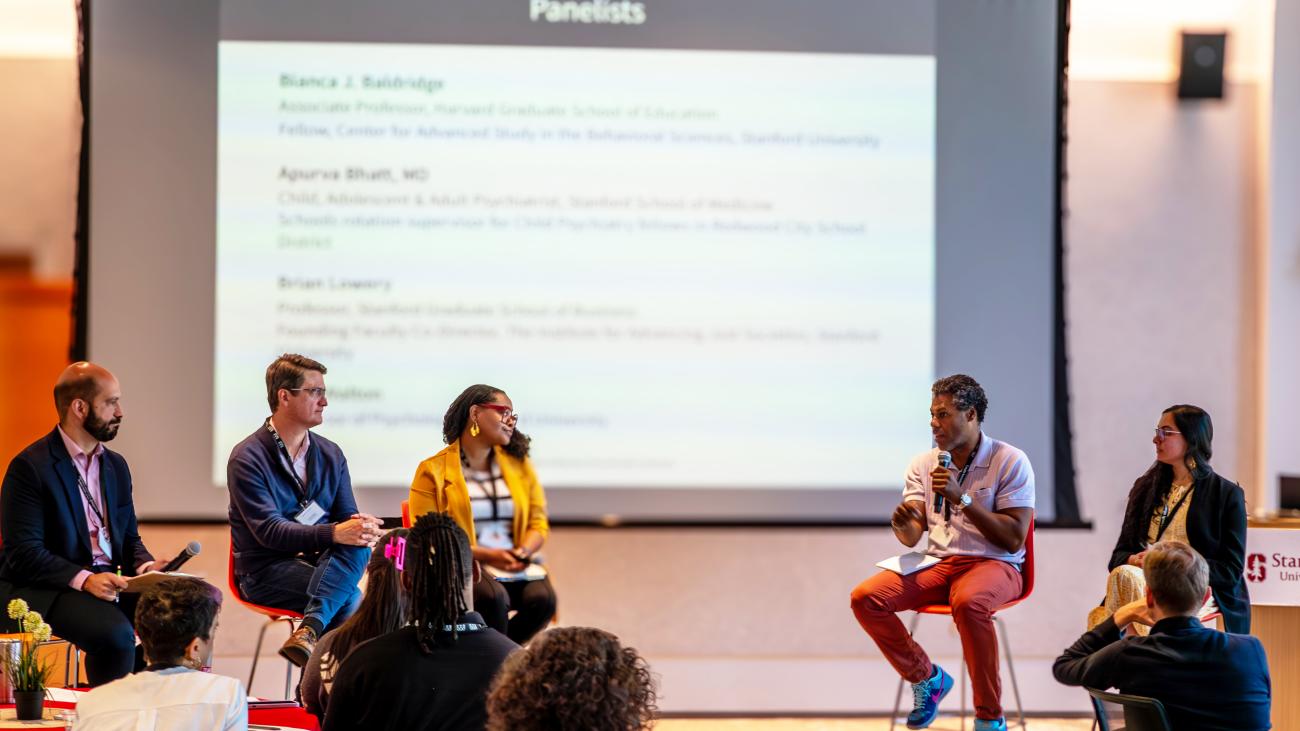Remember what it was like to be a freshman in high school?
An expert panel tackles how a sense of belonging plays a critical role as students navigate the transition from middle school to high school.
While growing up in Chicago, Professor Brian Lowery changed schools several times before entering high school, a school where students agreed to commit themselves seriously to their studies and where he appreciated the sense of shared values. Even so, the dynamics of a racially segregated city were still at play, he says.
Lowery’s experience highlights just how complicated things can get for young people — and it’s why a recent forum brought researchers together with Bay Area school district administrators and staff to discuss how to support students and create environments where they feel they belong. Hosted by the John W. Gardner Center for Youth and Their Communities, the event stemmed from a grant through Stanford’s Office of Community Engagement to study the middle school to high school transition process.
Of particular concern for panelists and attendees alike was how this all plays out in an environment like Silicon Valley, which is characterized by vast socioeconomic differences. Many students from historically marginalized, systematically oppressed groups find themselves transitioning from schools, districts, and communities to much larger, more diverse settings — settings where they may not feel they belong.
“In these diverse spaces, opportunities to belong are not equitably available to all youth,” explained the panel’s moderator Sebastian Castrechini.

Sebastian Castrechini from the Gardner Center (far left) and panelists (l - r): Greg Walton, Bianca Baldridge, Brian Lowery, Dr. Apurva Bhatt.

Event attendees shared strategies they use at their schools to help students feel like they belong.
Why belonging matters
If students don’t feel like they belong, they are less likely to do well in school, points out panelist and psychiatrist Dr. Apurva Bhatt. “Belonging plays a critical role in a young person's development,” she observes.
“When students feel that they belong at school, they are more likely to engage and participate and thrive academically and socially,” she continued. “This sense of belonging fosters a supportive environment where students feel safe to express themselves, take risks, and embrace new learning experiences. Students who feel they belong at school are less likely to be absent, as school becomes a place of support rather than a source of stress.”
There’s a lot of research that backs that up, which panelist Greg Walton shared with the group and also during a recent talk at the SXSW education conference. In one study, a group of middle school students was told that feeling like they don't belong is normal and surmountable; that simple message reduced absences by 18 percent, disciplinary referrals by 34 percent, and D's and F's by 18 percent.
Acceptance without conditions
So what does an elusive word like “belonging” really mean, and how can educators and administrators and community organizations create spaces that promote it?
Panelist Bianca J. Baldridge, an associate professor at Harvard Graduate School of Education, defines belonging as “acceptance without conditions,” which really seemed to resonate with the group. Youth take cues about their acceptance from aspects of the physical environment, like who is represented in the art and photography on the walls. This takes on extra importance in spaces that were not designed with students from minoritized backgrounds in mind.
Walton added that teachers also play a crucial role in helping students feel accepted and valued. “Kids know immediately if you want them to do well or if you’re just going through the motions,” he observed. He cited a study of 7th graders in which teachers explained to their students why they were giving them critical feedback, and it actually helped create a feeling of trust that the students carried forward to future grades.
Sharing personal experiences and challenges with students is another way to build that kind of trust, explained one attendee who is a middle school counselor. Others from the Ravenswood, Redwood City, and Sequoia school districts suggested additional strategies, like having a student culture and climate coordinator on staff and focusing on what students are doing well (not what they’re doing wrong).
The community connection
But the truth is that schools can’t do it all, says Baldridge, and that’s why community-based spaces and organizations are so important. Kids spend more time out of school than in school, and schools can and should forge connections with community-based organizations (CBOs) where young people spend time.
“There’s not a single institution responsible for this middle-school to high-school transition, which makes it even more important for us to collaborate across organizations,” says Gardner Center Executive Director Amy Gerstein. “That’s why it’s so important that we’re here today — to share what we know from our experiences and research in the field, and how we can apply it within our community.”
As the event wrapped up, Lowery emphasized that no matter how hard educators and CBOs try to create spaces where all young people feel they belong, we’ll always fall short — and so it’s critically important that we also teach young people how to successfully navigate unfamiliar and uncomfortable spaces.
This “both and” approach points to fruitful conversations ahead as the Gardner Center continues to study this topic and engage community partners in how to put these ideas into practice — so all young people can feel secure enough to explore who they are and have the opportunity to become who they’re supposed to be.
The Gardner Center is engaged in a long-term partnership with local school districts seeking to build capacity to support youth mental health and wellbeing. If you would like more information, contact Kristin Geiser or Sebastian Castrechini.

